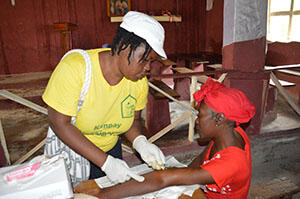This woman of 34, who is already mother of three children, came for a Jadelle implant, a long term family planning method.
"I would not like to have another child so that I can move forward in everything I do. Because when you have children, you must take care of them. There is school and all those things. You must have the means for this", believes Marimène.
As well as Marimène, many other people have come, despite the rain that has begun the day before.This is the case of this woman of 22, who is 7 months pregnant whereas she already has 2 children. In consultation, she complains about several illnesses.
"When I lie down, I have stomach ache, I itch, my kidneys hurt me and are swollen. I can not walk, my whole body is swollen. In addition, I have a vaginal infection, testifies Ulaine.
The health problems in Bel-Air are not different from those observed in Baie d'Orange, another isolated communal section of Belle Anse, which hosted, the day before, the eighth mobile clinic organized since 2014 by the Ministry of Public Health and Population and UNFPA, the United Nations Population Fund, noted the head of reproductive health at the Southeast Health Directorate.
The most common diseases in these localities are anemia, vaginal infection, parasitosis (abdominal pain), dizziness, headache.
In the two mobile clinics in Baie d'Orange, we saw some two hundred people, including adults, children, pregnant women and people who have come for family planning, says Dr. Josette Sanon.
We thought it was important to extend these mobile clinics to other communal sections of Belle-Anse, she concludes.
Besides health, including sexual and reproductive health, basic services are virtually non-existent in these two localities.
The Ministry of Public Health and Population and UNFPA have led in recent years, an awareness and advocacy campaign on Baie d’Orange's reality in particular, through the dissemination of a documentary.


